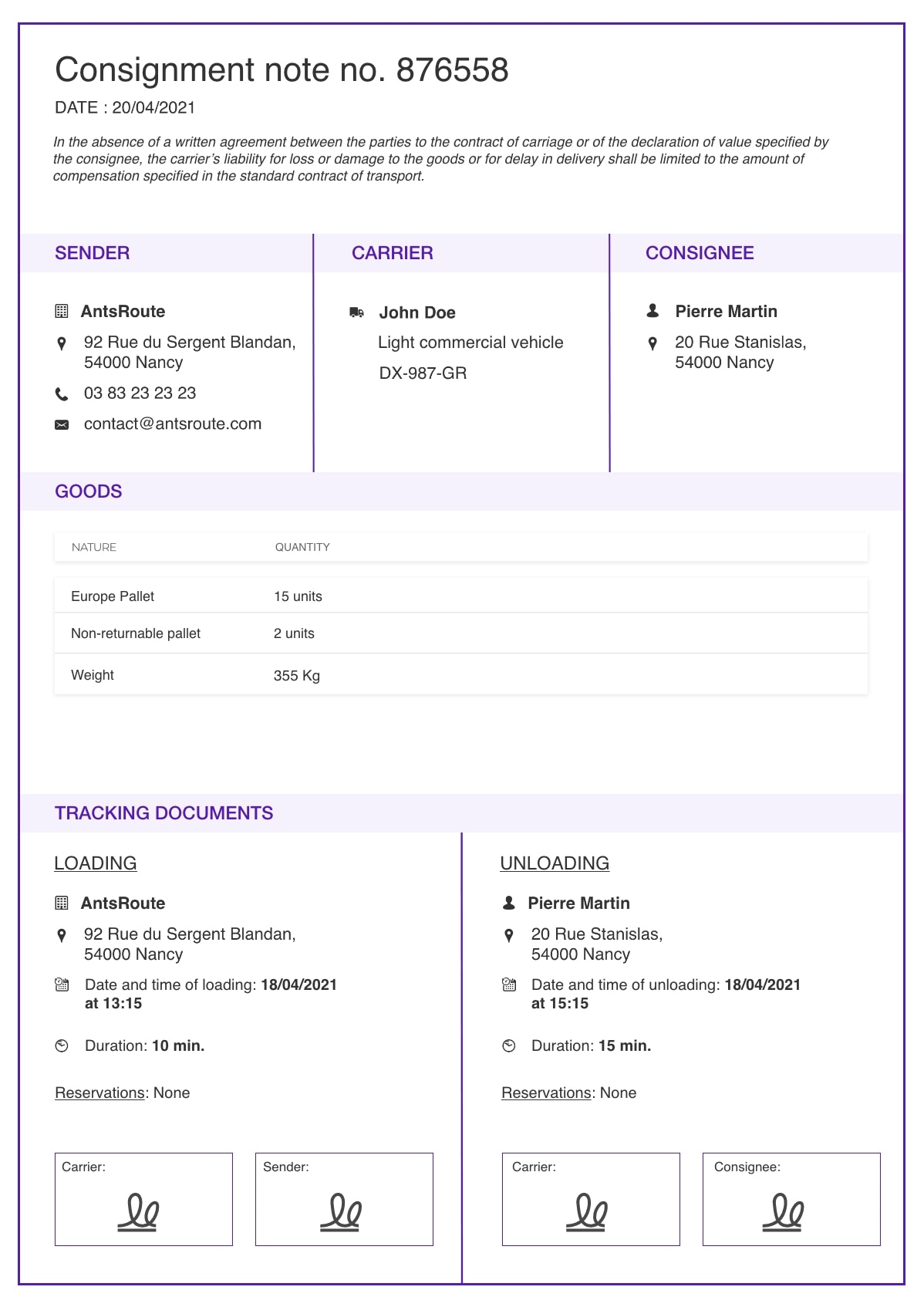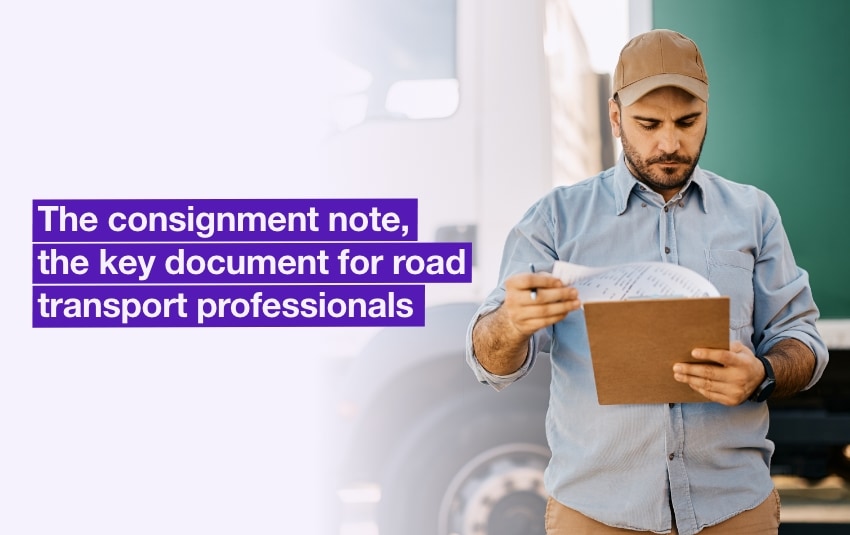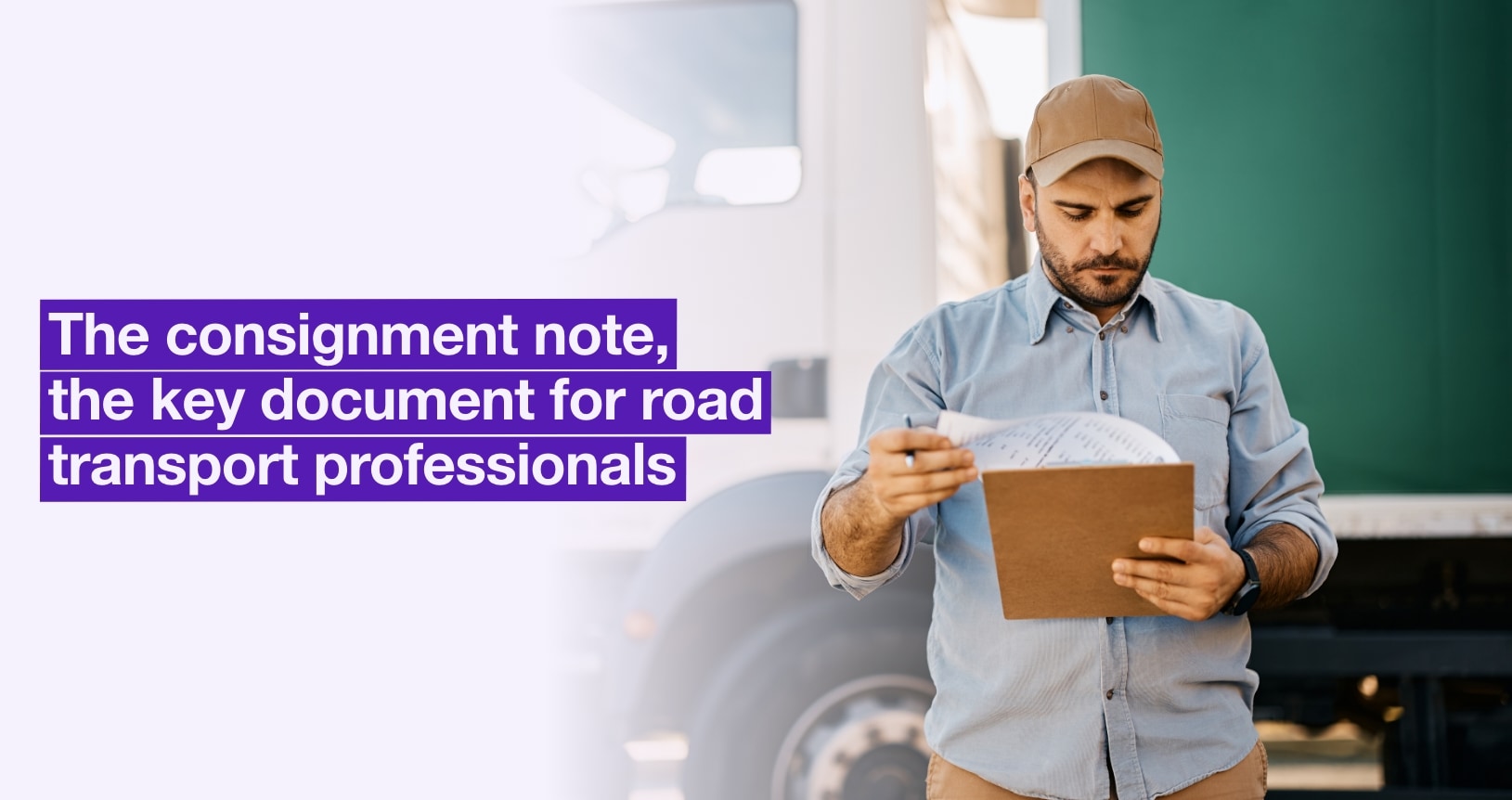The consignment note, the key document for road transport professionals
Published on 14 November 2022 • Reading time: 5 min read
The international consignment note is a compulsory document for any transport of goods, from or to a country that has ratified the Convention on the Contract for the International Carriage of Goods by Road (or CMR). The CMR is an abbreviation of the French title of the convention, Convention relative au contrat de transport international de marchandises par route). Some countries, such as France and Austria, also require a local consignment note for certain operations, such as the transport of goods and house moves.
Read our guide on this little document that can save you a lot of trouble in the event of disputes or inspections by the authorities.
Table of contents
- What professionals are concerned by the consignment note?
- What are the rules for writing a consignment note?
- How to get consignment notes?
The consignment note is a mandatory document for transporting goods. The electronic CMR consignment note ensures greater efficiency. For road transport professionals, it guarantees optimum traceability of deliveries.
What professionals are concerned by the consignment note?
The international consignment note is a document whose terms are established by the Convention on the Contract for the International Carriage of Goods by Road (CMR for short). It comes from the French title of the convention, Convention relative au contrat de transport international de Marchandises par Route. This is why it is also called CMR document.
This agreement, signed in Geneva in May 1956, entered into force two years later.
Types of transport subject to the CMR note
The Geneva Agreement concerns the carriage of goods by road with payment in one of the following vehicles:
- Vehicles
- Articulated vehicles
- Trailersand and semi-trailers.
This treaty also applies to multimodal transport, where at least part of the transport is carried out by road. However, the carriage performed under the terms of any international postal convention, funeral consignments, as well as furniture removal, are explicitly excluded.
Countries where the Geneva Convention applies
To determine whether this treaty applies, it does not matter where the parties are located. Only “the place of taking over of the goods and the place designated for delivery, as specified in the contract” are relevant. If one of the two countries – of departure or arrival – has ratified the treaty, it will apply by right.
In 2022, 58 countries have ratified or signed the Convention, according to the official status of the treaty published by the United Nations. All 27 members of the European Union as well as Switzerland have ratified the CMR.
The national consignment note: possible adjustments state by state
While the CMR consignment note is required for some international transport, the countries can also require “the use in transport operations entirely confined to their territory of consignment notes representing a title to the goods”. In other words, the Geneva Convention sets minimum rules… but there is nothing to prevent the authorities from requiring more from carriers transiting their territory.
For example, in France the decree of November 9th 1999 regarding transport documents specifies that the consignment note must be on board of any vehicle carrying out :
- A contract of carriage of goods by road, whether domestic or international (Article 4).
- The transport of furniture or objects for furniture removal companies (Article 6).
Therefore, only carriers and movers offering services for third parties are concerned. If the company is transporting goods on its own account, an invoice, a removal order or a delivery note is sufficient.
In Belgium, the general rule is that the CMR consignment note is used, regardless of whether the transport is national or international. There are also specific models for furniture removals and domestic transport with a distance of 50 km or less.
If the vehicle concerned does not cross the Belgian borders, there are nevertheless many cases of exemption, depending on the type of vehicle used, its operating condition, the nature of the goods transported, etc.

The consignment note is compulsory for road haulage.
What are the rules for writing a consignment note?
In theory, the writing of this document can be the responsibility of any of the parties involved (sender, carrier or consignee). In practice, it is almost always the professional commissioned to carry out the transport who handles these steps.
Required information in an international CMR note
There is no specific format imposed for its drafting. However, the Geneva Convention provides 11 compulsory elements in its Article 6:
- The address and date, knowing that this document must imperatively be established before the goods are taken over.
- The name and address of the sender.
- The name and address of the carrier.
- The place and the date of taking over of the goods and the place designated for delivery.
- The contact details of the consignee.
- The nature of goods and the method of packing (pallets, parcels, bulk, etc.).
- The number of packages and their special marks and numbers.
- The weight of the goods or their quantity.
- The charges relating to transport, including the carriage charges, supplementary charges, customs duties and other charges incurred from the making of the contract to the time of delivery.
- The requisite instructions for Customs and other formalities.
- A statement that the carriage is subject, notwithstanding any clause to the contrary, to the provisions of this Convention.

An electronic consignment note created with AntsRoute software.
How to get consignment notes?
For your consignment notes, you can choose between paper or electronic documents. Both types of media are authorised, both in the United-Kingdom and internationally.
NCR pads
If you prefer the paper format, some printers and specialised companies sell online NCR pads designed for your specific needs:
- Sheets in national, European or international format.
- Customised pads with your company details pre-printed.
- Blank pad per unit for occasional use, etc.
Electronic CMR note
For obvious reasons, more and more professionals are choosing to use electronic consignment notes, as many specialised software offers this functionality.
This has also been the case for a few days with our route optimisation software. AntsRoute now provides an e-CMR note solution. This template includes by default all the information required for the transport of goods from or to a country that has ratified the Geneva Convention. Thanks to a smart system of custom fields, this template can be easily adapted to all your specific needs:
- Furniture removal services.
- Domestic deliveries to another European country or the Maghreb.
- Personalized designation of carried goods.
- Legal notice or reference to your general conditions, etc.
Available directly from the AntsRoute mobile application, our electronic consignment note system is already available in French, English, German and Spanish. It will soon be available in Italian!
Create electronic consignment note today
Free 7-day trial | No credit card required
Contenu
- What professionals are concerned by the consignment note?
- Types of transport subject to the CMR note
- Countries where the Geneva Convention applies
- The national consignment note: possible adjustments state by state
- What are the rules for writing a consignment note?
- Required information in an international CMR note
- How to get consignment notes?
- NCR pads
- Electronic CMR note






